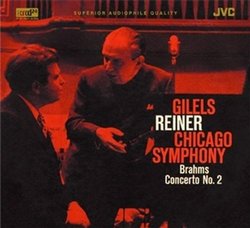| All Artists: Fritz Reiner, Chicago Symphony Orchestra, Emil Gilels Title: Brahms: Concerto No. 2 Members Wishing: 0 Total Copies: 0 Label: Jmc / Xrcd Release Date: 1/25/2005 Genre: Classical Styles: Chamber Music, Forms & Genres, Concertos, Historical Periods, Classical (c.1770-1830), Instruments, Keyboard Number of Discs: 1 SwapaCD Credits: 1 UPCs: 693692402223, 4975769301605 |
Search - Fritz Reiner, Chicago Symphony Orchestra, Emil Gilels :: Brahms: Concerto No. 2
 | Fritz Reiner, Chicago Symphony Orchestra, Emil Gilels Brahms: Concerto No. 2 Genre: Classical
|
Larger Image |
CD Details |
CD ReviewsA great performance, much more vigorous than Gilels/Jochum Santa Fe Listener | Santa Fe, NM USA | 11/10/2005 (5 out of 5 stars) "Emil Gilels became a ponderous interpreter in his later years, as witness the two Brahms concertos he recorded for DG with Eugen Jochum. Here he trims four minutes off the first movement alone, and Reiner, a far better conductor than Jochum, leads a totally disciplined CSO, making no attempt to beautify Brahms's massive orchestral textures--this is power and polish all the way. As a result, theirs is a great partnership, as opposed to Richert/Leinsdorf, also with the CSO, where Leinsdorf is clearly the weaker half. I haven't heard the 2005 RCA reissue of Gilels/Reiner (the one here) but earlier versions in various budget lines had fine sound without rising to the exalted level of Living Stereo. (The cheapest issue also includes the dubious bonus of Ormandy's lackluster Haydn Variations.) I don't think another reviewer here is right to say that Gilels is a classicist and Richter a romantic. The obvious difference between the two is that Richter was a lion at the keyboard, dominating the instrument as only Horowitz did in modern times, while Gilels (on records at least) was more self-effacing and middle-of-the-road, too much so later on. Both arrived in the U.S. during the Cold War and reminded listeners with a shock of how overpowering the Russian style of pianism was. All in all, I have relied on Gilels/Reiner being the greatest performance of the Brahms Second on disc, but relistening today, I must admit that Pollini, Ax, Fleisher, and Barenboim have all turned in equally impressive accounts." Blazingly passionate and sadly-neglected Brahms 2nd John Grabowski | USA | 01/17/2009 (5 out of 5 stars) "This recording should be better-known. In fact, it has been unfairly eclipsed by Richter's famous recording with Leinsdorf and the CSO a couple years later, and that's unfortunate, because this is superior. There, I said it. Much better, in fact. Richter always said he was not completely satisfied with his much-acclaimed recording, and while he often said this and many people think he was being either hyper-critical or falsely-modest, I'll just say overall, I agree with him. He knew better playing when he heard it.
From the first bar here, soloist and conductor roar out of the gate with a thrilling reading, as though they are discovering this wildly passionate music for the first time. That's the highest praise I can give any recording. Gilels performs with his usual golden-brown tone and patrician phrasing and occasionally gets in a little trouble, but you won't care. (This is, after all, one of the toughest concertos out there.) As the reviewer below me here notes, the two play *together* rather than as a concerto that's piano vs. orchestra, with the latter trying to tame a flashy and virtuosic former. After the epic first movement, with careful attention paid to structure (often interpretations are distended; Alfred Brendel has said he feels Brahms *First* Piano Concerto holds together better, and I think he's right, they blaze through the scherzo without pausing for breath. Yet things never get ugly or severe--beauty is always in the forefront despite some sound that's a little "edgy." (This is the very early stereo era, after all.) Then comes one of two movements that often don't make it for me--the Andante. Gilels and Reiner's approach is one of dreamy rhapsody (actually that's a description of their approach to much of this work, but never so much as here), with Gilels playing syncopations and arpeggios in between the CSO's fat string chords that are simply gorgeous. In the still section after that, they stop time and seem to enter another realm, the concentration from all involved extraordinary. Listen to the *sound* of this great orchestra--Reiner sure could bring out the best in an ensemble, remarkable for a man who looked like Satan in a tuxedo and conducted with both a scowl and a barely discernible beat to his baton. The finale is the other movement that is rarely brought off in recordings of this work. While this isn't quite Brahms at his best, the forces here do as good a job as I've ever heard, and manage to preserve the charm while removing some of the kitsch. This is better than Gilels' later, and less fiery, recording with Jochum on DG. (Not that that isn't very fine, too.) And I guess that's what sums up why this performance is the unfortunate dark horse among Brahms 2nd PCs--it's been eclipsed *both* by Richter's later recording with the CSO and by Gilels' own recording in Europe. Pity, because it may the lowest profile of the three, but it's the best, the one that probes this epic creation the most. Try it for yourself and see. You'll feel like you're hearing this warhorse for the first time. " |

 Track Listings (4) - Disc #1
Track Listings (4) - Disc #1